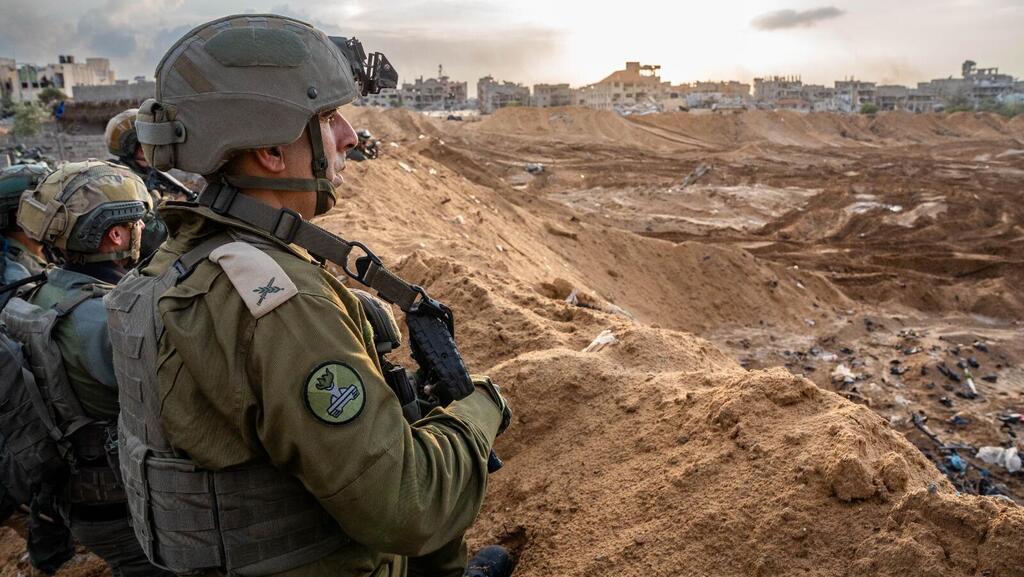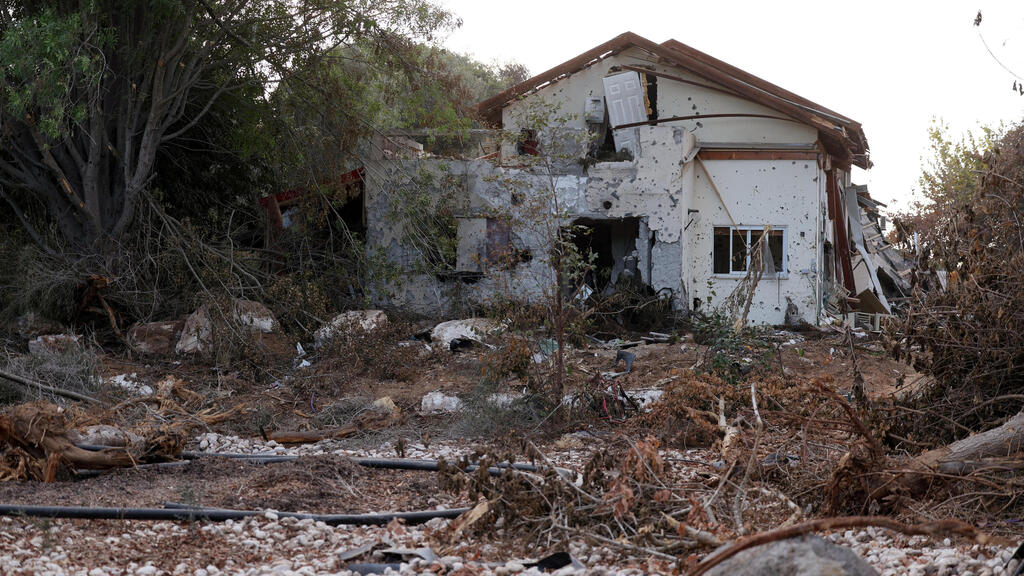Getting your Trinity Audio player ready...
A cross on the uniform of an Israeli soldier is not a common sight. Among the hundreds of thousands of Israeli soldiers you might find no more than a handful.
With tens of thousands of reservists added to the rolls of the Jewish state’s army as it fights a war against Hamas terrorists, two bold soldiers adorned with the symbol of their Christian belief are the sons of International Christian Embassy Jerusalem President Dr. Juergen Buehler.
Read more:
The Media Line’s Felice Friedson spoke with Buehler about emerging trends in the Israel-Christian relationship, his sons choosing to serve in the Israeli military, and ICEJ’s service to the nation during the current crisis.
You have two sons. They weren’t born Jewish. You’re Christian. You are running a Christian Embassy here. How do you feel as a father having two children in the army?
"I think like every parent in Israel. One of our boys is in a combat unit. He’s actually in the front lines right now. One son is in a more secure place, but also goes back and forth to different lines.
"And of course, the first thing when you hear somebody unexpected knocking at the door, you wonder what’s happening; is there bad news coming? Especially my wife; We are under constant tension. You pray more than you ever prayed before for the safety of not only our own kids but of friends and comrades that they have around them. And it’s really a life change to experience that firsthand, what Israel is going through for more than 75 years now."
How long have you lived in Israel?
"We moved here 29 years ago. I came here as a student of physics. I was at the Weizmann Institute. Now, I’m at the Christian Embassy, so it’s a long time."
How did your children end up in the army? I mean, many people know that there’s been some problems in terms of citizenship, being Christian, and living in Israel. So, if you could just explain that a little bit.
"Well, it’s actually due to our youngest son. He was the first one to end up in the army, and from [his] small childhood, it really was his life dream to serve one day in the IDF and be a part of the Israeli army.
"Through him, through different contacts, we contacted people in the Israeli army and said that our son wants to go to the army. We had temporary residency. Today, we have permanent residency, so they accepted our statement. Through that, we came into the system, and then the second boy was drafted in. That’s the story.
"They grew up here in Israel. They were born here in Israel. Of course, they knew we are German. They grew up Christian, but at the same time, all of their friends were Israelis and they really felt at home here. They felt that this is a great nation to live in, and for them, it’s natural to defend the country where they are living."
6 View gallery
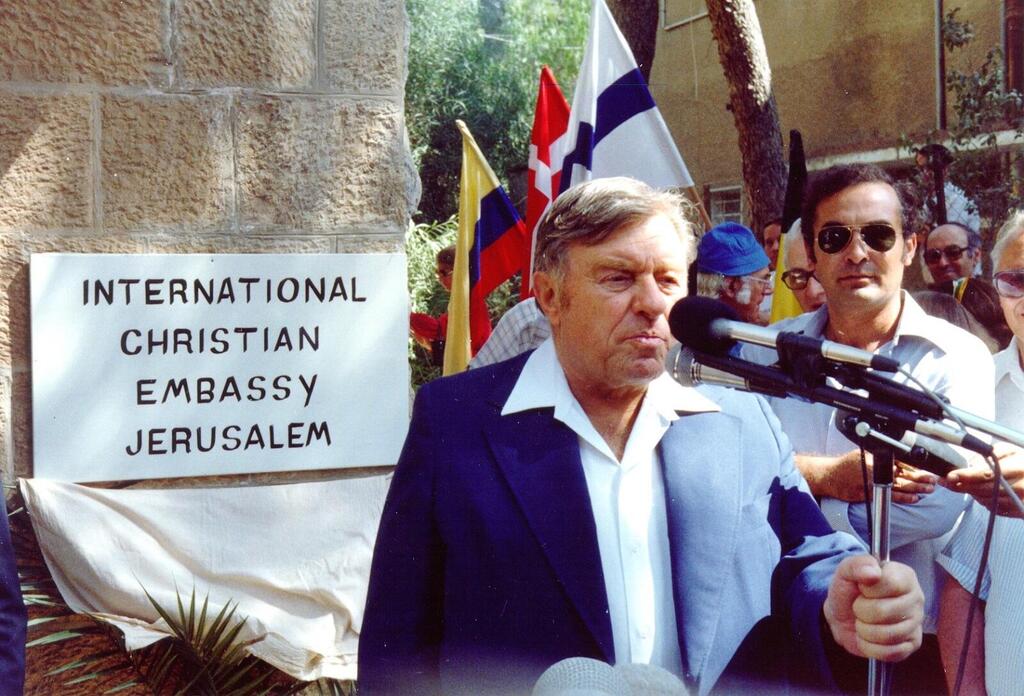

Then-Jerusalem Mayor Teddy Kollek at the opening of the International Christian Embassy Jerusalem in 1980
(Photo: Courtesy ICEJ)
How many other Christian families are living in Israel in the same situation as yourselves?
"Not too many. I think that there are many long-term families that are living here, but their children don’t have to serve in the army. Our children made the decision that they want to go into the army. We didn’t force them or strongly encourage them, because we knew that it’s a life-and-death decision that they have to make, and it proved to be true in the situation we are in right now.
"Many [Christian] parents also encourage their children not to go to the army. Our boys made the decision. There’s maybe two or three other families like ours that made that decision with a Christian background that sent their children to the army."
Looking at your family background, and understanding where your roots were, how do you think your grandfather or father would have looked on the fact that you now have two sons in the Israeli army?
"Well, my father, our sons’ grandfather, he was Hitler’s soldier. He was serving in the Wehrmacht, and serving in an army that had a target to annihilate: the Jewish people in Europe. And it was a very unique experience that my father had, where a Jewish doctor actually saved his life in a prison camp. That really turned him around. And he became a friend and a lover of the Jewish people. And that’s how he raised us.
"I believe my father would be absolutely proud to see his grandsons serving in the Israeli army. It’s also very special for both of our boys to do that as a German. I was visiting maybe three days before they went into Gaza; we still could visit them on one of the army bases where he was. And a young American soldier who was together with him, an Israeli IDF soldier who was a new immigrant from the US, he says: “Oh, you are the father of Simon? He says that I need to tell you that I lost my whole family in the Holocaust. My grandparents were the only ones from the whole family clan that survived. I never wanted to talk to Germans. Never wanted to shake the hands of Germans.
"He says, “You don’t know what it means to fight now in Gaza together with a young German who loves the Jewish people.” He says, “That’s the story of my life.” And it was such a touching experience to see that."
How many Christians are living here in Israel right now? There are evangelical Christians. There are Christians from other denominations. Oftentimes, people don’t know that there is a difference.
"I think the official number is something like 200,000 Christians here in Israel. The vast majority of them are [referred to as] “history churches,” as we call them; they would be Catholics, Maronites, Orthodox Christians. That means churches that are here for centuries.
"Evangelical Christianity, like we represent, is a relatively new brand of Christianity. It emerged over the last 100 years, and my guess is that there are around 30,000 evangelicals, 40,000 evangelicals maximum, that are living here. But many of them are short-term visitors. Those who are coming from abroad, they stay here for a few years helping in different organizations and then they return back to their land. I think that there are very few like us who are here for many decades in the land of Israel."
6 View gallery
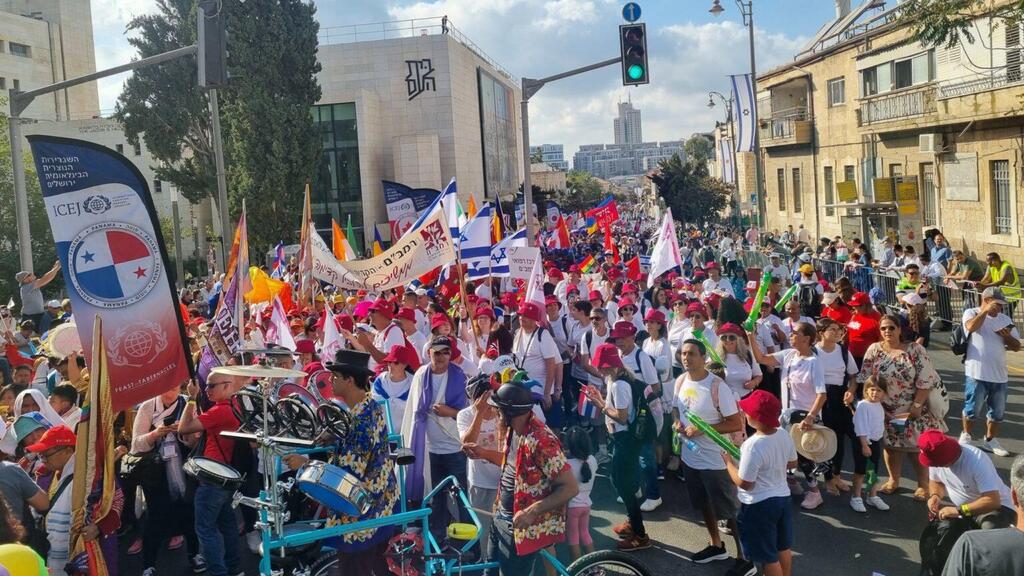

Pilgrims take part in the Jerusalem March on Oct. 13, 2022
(Photo: Maya Margit/The Media Line)
So many groups come from all over the world through the [International] Christian Embassy to see the land of Israel, and at this time, there are very few flights coming in and out of Israel during the war. How has that changed your operations?
"It changed it a lot! First of all, I have to tell you that we came out of the biggest tourist event that was here in Israel. The very last day of the Feast of Tabernacles was the 6th of October, and our tour groups, 80% of them, were still in the country of the around 3,000 pilgrims that we had here.
"That means that the tourists who were here, they were sitting the next day in the bomb shelters in the hotels in Tel Aviv or in Jerusalem, and, in a way, it did a lot. I must say it had a kind of positive impact on them, because every single one of them who I talked to of our leaders of the tour groups, who checked how they’re doing, they said that this was such an important experience. Because we always read through the news what Israel is going through, and of course, we pray for Israel. We stand for Israel. This is the first time that we experienced for ourselves in our own skin what it means to go to a bomb shelter. What it means to have the uncertainty of what Israel is going through.
"In a way, it did something that I believe those people who were still here from [after] the Feast of Tabernacles, they are much more loyal friends of Israel than before. And of course, it changed the operation. We are about to plan a pastor’s conference. Most likely this conference will take place, but at the same time, it is also an opportunity where you see the outpouring of love and support from around the world like at hardly any other time.
6 View gallery
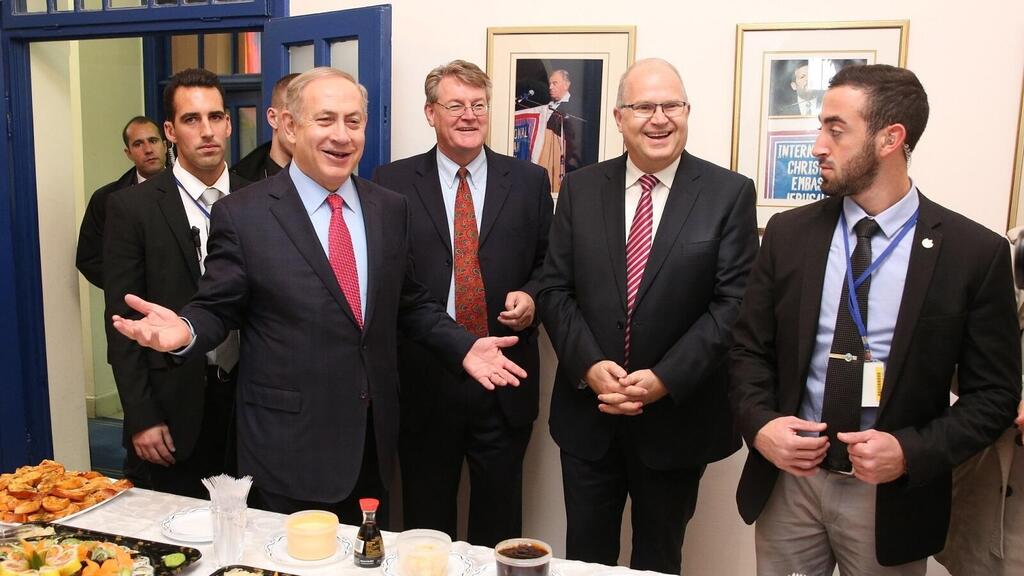

Israeli Prime Minister Benjamin Netanyahu visits the International Christian Embassy Jerusalem for Christmas 2016
(Photo: Courtesy ICEJ))
"We had so much support and donations coming in. Just now, about an ambulance that was being paid by the Czech Republic, and another ambulance from Switzerland. We just got half a million dollars from Germany coming in. Other money is coming in from the United States. [There are] more ambulances there, so it’s a great time of generosity where people show, they don’t only say they love Israel, but they really put their money where their confession is."
Several days before the massacre on October 7, you were with a group in Kibbutz Be’eri planting trees. And then, cut to a couple of days later, what went through your mind when you saw the atrocities of that day?
"Well, you need to understand that we have a relationship with the Gaza [periphery communities] that dates back more than 10 years. We have been building bomb shelters there. It’s more than 200 bomb shelters that we have been building there. Many more need cleaning up and taking care of them. And we’ve really developed close relationships to people like Ofir Lipstein, who welcomed us that very day of the Feast of Tabernacles. The head of the regional council like Shai Hermesh, a former member of Knesset, and also the former leaders of the regional councils.
"They became friends and we talked to each other on the phone and wished each other a Happy Hanukkah. We were there on the 5th of October. We were right down there at the Gaza envelope. We had 700 people with us. We had an amazing time. Some of our pilgrims said that this event, we don’t know why, but it just felt special to be there at the Gaza envelope. Some said it was the best event during the whole Feast of Tabernacles, and Ofir Lipstein was standing there. He was welcoming us.
"The last words I remember hearing from him was “Juergen, you need to promise, you have to come back next year again.” And two days later, I was hearing the news about the rockets coming down on Gaza, and my first thoughts went to him and I called him. There was no answer on the phone. It was 8:00 a.m.. Later on, I heard that he was one of the first victims that was shot at that morning.
"We were planning, like you said, a forest, the Be’eri Forest, and this became a part of the ICE, the International Christian Embassy Nature Park, so [we] really are embedded in that area where this horrendous attack took place. We were driving on the streets; two days later, it was covered with dead bodies those streets, so in a way, for us, it almost felt for us almost like God placed us there in that surrounding; that He wants in a way tell us that this is the people; these are your friends; we want you to take care of them. And we want you to be involved in what’s taking place.
"That’s why, today [and] every single day since that first day [of the attack], we called an online prayer meeting. I am not sure how many people come to our online prayer meeting. We had around 600 or 700 people joining us, and soon, since then, that number kept growing and has kept the same for more than a month now. People pray for Israel. They give for Israel.
"And I believe that in more than 25 countries around the world, people go out in the streets [and] have pro-Israel demonstrations, and I think it’s exactly because of that. They felt that there is this relationship with that community that, in a way for us, it was almost a very tragic but divine connection with the people who live in the Gaza envelope."
6 View gallery
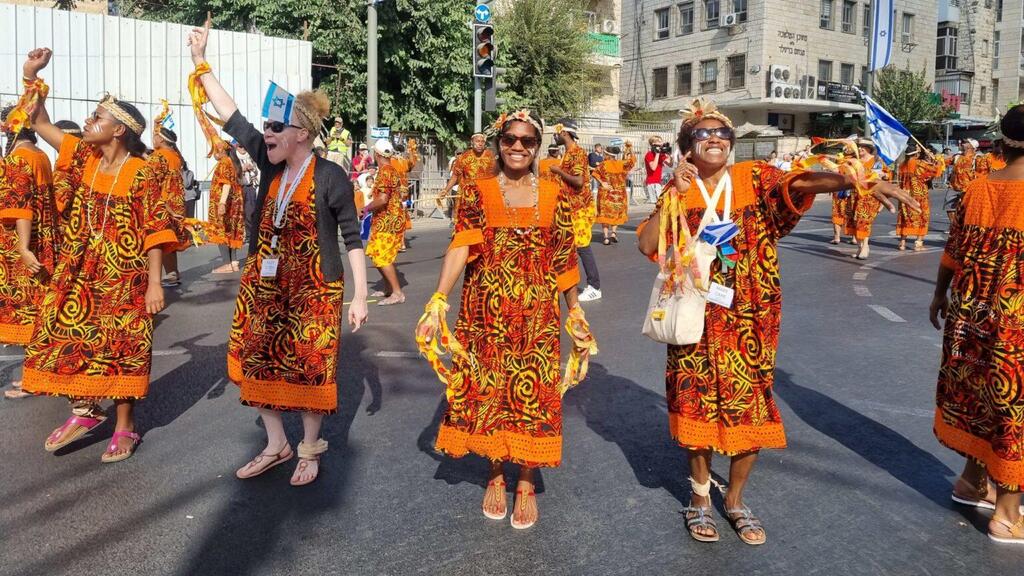

Pilgrims take part in the Jerusalem March on Oct. 13, 2022
(Photo: Maya Margit/The Media Line)
There are people that belong to the Christian Embassy that come from all over the world. There were Nepalese that also were wounded [and] killed, and I understand that some of them were involved with gifting here. Can you shed some light on that, because these are not people of means?
"Yeah, absolutely! The generosity of the Nepalese people, you know, they left a donation of $10,000, and they are one of the poorest countries in the world. The generosity of our people is amazing. We have one of our biggest delegations in Bolivia. It’s a country that is considered the poorest country in Latin America, and not only did we have 100 people coming from there, which means for those people coming here it’s taking several months’ salary of investment to be here in Israel. They also left a very generous donation back here in Israel.
"That means those people from around the world, be it the Philippines, Bolivia, from Tanzania, I just had a Zoom call yesterday with a big church from Tanzania that is supporting aliyah for the Jewish people back to Israel in big amounts. It is unbelievable for us.
"Their average salary for the month is $300. Yet, from Tanzania, last year we received $30,000 or $40,000 to support aliyah. Right now, they are collecting offerings all across those countries, because they want to stand with Israel when it’s needed most. And it’s very heartwarming to see that this is not just a religious confession, but a relevant one in a sacrificial way, they want to stand behind the nation of Israel."
Many of these countries are not friends of Israel. They are looking at the television networks, and they’re possibly looking at the story differently than maybe you’d like to see it. What do you say to those people?
"You know, even our people, even in Bolivia, which I think was the first country that terminated their relationship [with Israel] when the war started. At the same time, one of our strongest branches in Latin America is from Bolivia. You have to differentiate. There are evangelical Christians all across the Latin American subcontinent and those Christians – they all stand with Israel. Why? Because they read the Bible.
"You know, it’s so often. We are dealing with half a billion evangelical Christians that are all over the world. It’s impossible for us as the Christian Embassy to teach all of them. I was recently in China, a nation that is not super friendly to Israel, and I was talking to a group of pastors in a big city in China. They represent something like one million believers in that area, and I talked to them about Israel.
"They said that 'you are the first time a visitor from Israel came [here]. You are the first one to come.' I thought I gave them a very basic teaching about why Israel is important for Christianity. Within a short time, I realized they understood, and they knew everything, and I was teaching them, and so I asked them, 'Who taught you? Somebody must have taught you!'
"And I’ll never forget that the guy looked at me with big eyes and says: 'What do you mean who taught us? We just read the Bible. It’s everywhere in the Bible. Wherever you open the Bible, you find Israel, Israel, Israel. We know we need to bless the Jewish people. We know they are the chosen people. We know we have to stand alongside them.' It’s a global phenomenon that is independent of what the government policy represents in those countries.
"Evangelical Christians, because they read a Hebrew Bible, a Jewish Bible, the Tanach, they understand that they need to stand with the Jewish people, with the State of Israel."
There’s a lot of human sacrifice right now on all sides, and you have to look at the massacre of what happened on October 7, but also look at the plight of many of the innocent Palestinians as well, and I’m not talking about Hamas terrorists. How do you feel about that when you’re looking at war and touching on people’s hearts as a devoted Christian?
"Well, looking at what’s happening in Gaza today, it reminds me about what happened in Germany. First of all, speaking about innocent Palestinians, more than 40% were voting for Hamas and they knew exactly what [they were voting for]. It was written in [their Charter] and one of their main targets was to kill Jews. It’s part of their party statement, so they generated an atmosphere that is very comparable to what happened in Nazi Germany where a huge part of the German population actually fully endorsed what Hitler was doing.
"In a way, what Germany really needed and what my father was always telling me, he says that it was always important for Britain and for the United States to really with a strong hand go against Germany [and] bomb German cities and really bring Germany to their knees. That brought us to Ground Zero, so to speak, where we could build up afresh. Otherwise, this Nazi spirit would still be living on in Germany today.
"And I think that is what is happening in Gaza today. It’s brought down to a Ground Zero level, but I think that if we do it right, [and] if we have a Marshall Plan, so to speak, for the Gaza community, where you invest in education [and] where it’s not tolerated anymore to teach to hate the Jewish people, to be against the State of Israel, I believe this actually could be a fresh start, a reset for the Gaza community, and it could turn out to be a blessing for those people."


